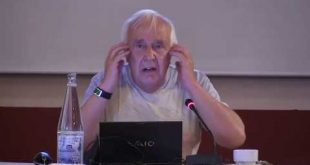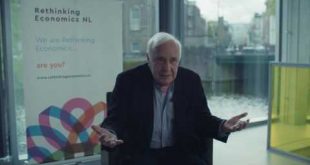Bloomberg interview on central bank independence, and the role of monetary and fiscal policy 20 years after the Bank of England was made independent: www.bloomberg.com/news/videos/2017-09-28/skidelsky-central-bank-independence-won-t-last-video Comments:There are no comments for this entry... Add comment: Name*: Email*: Location: URL: Comments*:
Read More »Germany’s Hour
Who runs the European Union? On the eve of Germany’s general election, that is a very timely question. One standard reply is, “The EU’s member states” – all 28 of them. Another is, “The European Commission.” But Paul Lever, a former British ambassador to Germany, offers a more pointed answer: Berlin Rules is the title of his new book, in which he writes, “Modern Germany has shown that politics can achieve what used to require war.” Germany is the EU’s most populous state and its...
Read More »“Never explain, never apologise”: review of David Kynaston’s Till Time’s Last Sand
David Kynaston is a wonderful social historian, with three massive volumes on post-war Britain and many others to his name. He has been a leading practitioner of “history from below,” reflecting the experiences of ordinary people. He has now turned to telling the story of one of Britain’s most powerful and mysterious institutions—the Bank of England, from its founding in 1694 up to 2013. He faced a number of challenges. Anyone writing an official history is bound to pull his...
Read More »Stylised Facts
I don’t want to say too much about Nicky Kaldor’s actual stylised facts, but about the methodological implication of the stylised facts approach. Paul Samuelson famously said, “those who can do economics, do it; those who can’t, babble about methodology”. Kaldor could certainly do economics, but he needed a methodology to enable him to do what he wanted to do. This is my excuse for babbling. But let me start with his inaugural lecture at Cambridge in 1966, “Causes of the Slow...
Read More »Robert Skidelsky – The Rise of the Robots: Ethical Issues (с русскими субтитрами)
Лорд Роберт Скидельски, член палаты Лордов британского парламента. Сессия "Этические проблемы в эру роботов". (Включите субтитры для русского перевода).
Read More »A Trip Through Putin Country
VLADIVOSTOK – Russia’s Baikal-Amur Mainline (BAM) railway “can be hardly named as a popular tourist attraction,” says one tourist website of the some 2,000-mile railway traversing Eastern Siberia and the Russian Far East. “Most people even never [sic] heard of it.” The BAM’s older rival, the Trans-Siberian Railway, is certainly more popular. Since opening in 1916 it has attracted many big names, including the travel writers Peter Fleming, Paul Theroux, and Colin Thubron. But it...
Read More »Now austerity is over, let’s commit to investment—and build a national bank to do it
Deficit fetishism has finally been defeated. As I recently wrote in these pages, this year’s Queen’s speech finally put “strengthening the economy” ahead of “the public finances.” This is progress. But there is still no agreement on what should replace austerity. If the doctrine that a country can cut its way back to prosperity is dead, the hunt for new answers should start with the most obvious alternative—enriching ourselves by investing in valuable things. The state must...
Read More »Robert Skidelsky: The Relevance and Influence of Keynes
Interview of Robert Skidelsky by Sam de Muijnck (Chairman Rethinking Economics NL) in Amsterdam.
Read More »The Protocols of Donald J. Trump
LONDON – It is an odd quirk in the history of logic that the blameless Cretans should have given their name to the famous “liar paradox.” The Cretan Epimenides is supposed to have said: “All Cretans are liars.” If Epimenides was lying, he was telling the truth – and thus was lying. Something similar can be said of US President Donald Trump: Even when he’s telling the truth, many assume he is lying – and thus being true to himself. His trolling is notorious. For years, he...
Read More »Austerity simply doesn’t work—its death is long overdue
Subjects can dominate the agenda one day, and then drop from view. Something of the kind has been happening to austerity. Two years ago nothing seemed so important to George Osborne as eliminating the budget deficit. In 2015, fresh from masterminding the Conservatives’ unexpected win, Osborne pledged himself to achieving a surplus by 2019-20 and announced further cuts of £12bn in welfare. Austerity, having been relaxed before the election, had returned with a flourish. Not only...
Read More » Robert Skidelsky
Robert Skidelsky


